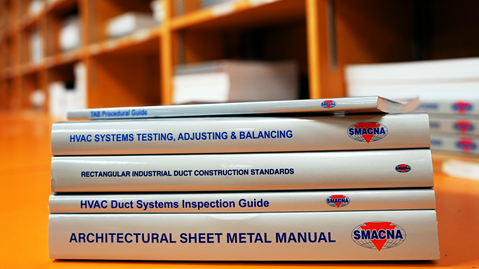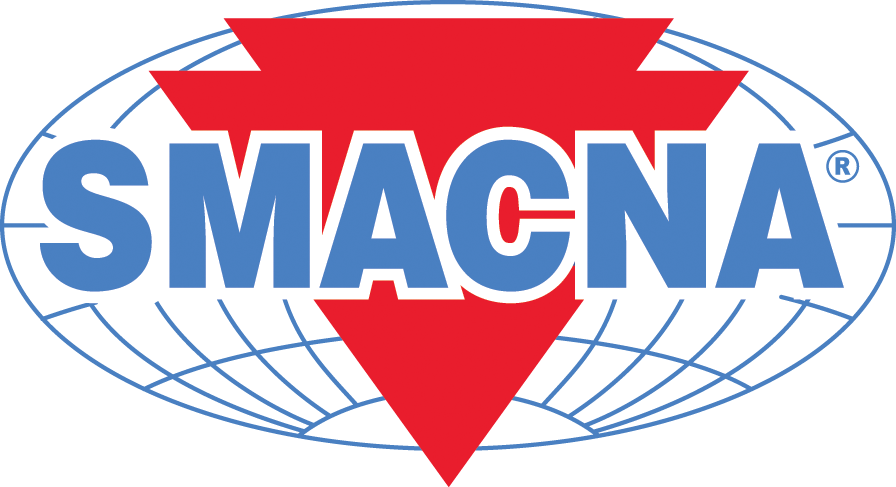Best Practices Guides
One of the tasks of the Best Practices Market Expansion Task Force is to identify best practices developed at the local level and assist other programs with replicating such successes.
Building Residential Success Best Practices in HVAC Service & Replacement
Residential HVAC is one of the fastest-growing opportunities in our industry. This joint SMART/SMACNA webinar, brought to you by the Best Practices Market Expansion Task Force, shares proven best practices, directly from labor and management partners who’ve made it work.
Best Practices for Entering and Succeeding in the Residential HVAC Service and Replacement Market
SMACNA’s Seth Lennon interviews Paul Heimann (Welsch Heating & Cooling), Scott Pires (Residential Technician, Welsch Heating & Cooling), Chris Racherbaumer (Local 36), and Jake West (Local 36) to talk through challenges, problem-solving, and collaboration within the Residential HVAC industry.
Labor Management Partnerships A Discussion (13:42)
A snippet from a discussion with SMART General President Michael Coleman and SMACNA President Elect Tom Martin.
What Does Your Labor/Management Relationship Look Like? (2:15)
SMART General President Michael Coleman and SMACNA President Elect Tom Martin talk about the workings of a successful Labor/Management Partnership and their collaborative relationship in Cleveland that made it possible to work together on important topics.
How Did You Approach Collective Bargaining? (3:20)
A snippet from a discussion with SMART General President Michael Coleman and SMACNA President Elect Tom Martin.
What Did You Do To Strengthen Your Labor/Management Partnership? (2:15)
A snippet from a discussion with SMART General President Michael Coleman and SMACNA President Elect Tom Martin.
What is the Foundation of a Strong Labor/Management Partnership? (1:25)
A snippet from a discussion with SMART General President Michael Coleman and SMACNA President Elect Tom Martin.
12 Tips to Help Overcome Barriers
A practical guide offering 12 concise tips to help labor and management partners build trust, improve communication, and overcome relationship barriers.
Avoid Common Barriers to Cooperation
A quick-reference guide outlining six common pitfalls that hinder labor-management cooperation, with insights to help teams build stronger, more collaborative relationships.
 What is Brainstorming?
What is Brainstorming?
A quick guide to effective brainstorming, highlighting its role in sparking creativity, encouraging participation, and generating solutions collaboratively.
Consensus
This document outlines key principles and practices for effective consensus-based decision-making in committees, emphasizing inclusion, participation, collaboration, and continuous improvement.
Six-Step Problem Solving Process
A structured, six-step framework for identifying problems, uncovering root causes, generating solutions, and implementing and evaluating action plans using data-driven decision-making.
Understanding Each Other
A guided conversation tool with four questions designed to foster mutual understanding, trust, and collaboration between labor and management groups.
Download Related Reading Related Reading
Agenda Item Submission Form
A structured form designed to help labor and management clearly articulate workplace issues, proposed solutions, and shared interests for effective agenda setting.
Benefits of a Solid Working L-M Relationship
A brief overview highlighting the key advantages of maintaining a strong, collaborative labor-management relationship in unionized workplaces.
Download Related Reading Related Reading
Characteristics of Successful L-M Committees
An outline of the key traits—like persistence, sincerity, patience, and consideration—that define successful and sustainable labor-management committee relationships.
Functional Levels of L-M Committees
This document outlines the four developmental stages of Labor-Management Committees—Getting Started, Learning to Work Together, Strategizing, and Implementation—emphasizing trust-building, collaborative skills, and evolving committee dynamics at each level.
L-M Committee Assessment
This document is a self-assessment tool designed to help Labor-Management Committees evaluate the health and effectiveness of their collaboration by examining communication, trust, decision-making, problem-solving, and long-term planning practices.
Best Practice 101: How to Benefit from the Code of Excellence
In essence, the Code of Excellence Program is a marketing and action policy designed to develop a pride of ownership by SMART members and demonstrate the professional workmanship and productivity provided by those members every work day on every job site. It is instrumental for demonstrating the added value of the SMART and SMACNA partnership.
Best Practice 102: Establish a Construction Trades Recruiting/Marketing Program
One of the biggest challenges facing many building trade industries is the shortage of skilled workers. No longer are careers in the trades considered desirable, as every student is encouraged to pursue a university degree after graduating high school. Thus, fewer individuals are entering the profession at the same time as many experienced workers are reaching retirement age. Construction contractors even find it difficult to fill back-office positions like accountants, book keepers, and human resource and marketing professionals. However, if there are no jobs for union labor and their signatory partners, this shortage of skilled workers isn’t meaningful. Thus, any campaign to increase recruiting must go hand-in-hand with a marketing program that educates potential customers about the advantages of using the SMART-SMACNA team.
Best Practice 103: Long-Term Planning for Market Expansion— Central California
There is never a bad time to begin long-term planning for market expansion. In Central California, signatory contractors, members of the Local, plus staff at SMACNA, SMART, and the training center sat down when the market was excellent to map out a long-term plan for market expansion that included outreach, education, marketing, and training. As it turned out, timing was key. By not waiting until the market hit bottom, contractors and their union laborers had more options available to withstand the drastic downturn in construction when it hit. The team also set into motion the means to have crafts persons available as the market demands by supporting the Lincoln High School Engineering and Construction Academy and other recruiting programs.
Best Practice 104: SMACNA Kansas City and SMART Local 2 Local Partnership Conference and Joint Program
SMACNA Kansas City and SMART Local 2 came together on strategic planning efforts in order to identify and address their top concerns. Together they applied for and received funding from the national SMACNA-SMART Best Practices Market Expansion Task Force to hold a local partnership conference, where they established a structure to ensure that action items would move forward in an effort to improve market share in the Kansas City area.

Technical Standards
Shop the SMACNA bookstore for all technical standards, including the most recent editions and recently revised manuals.
Shop Now
